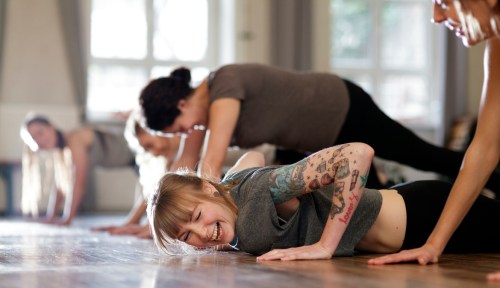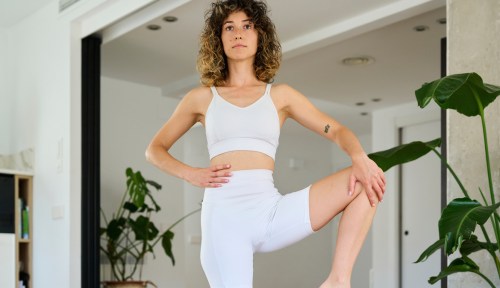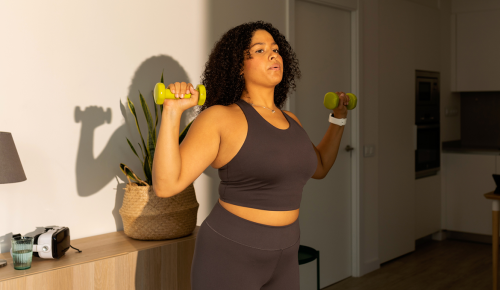Did you know that Jazzercise is still going strong? Yep, Jazzercise, the aerobics workout involving many a high-kick and grapevine that your mom or kooky aunt probably did while wearing leg warmers and a badass leotard in the ‘80s.
Experts in This Article
associate professor and co-director, Sport and Performance Psychology
Graduate School of Professional Psychology, University of Denver
pulmonologist and critical care specialist at UCLA Health
Jazzercise President
I recently went to an actual, IRL Jazzercise class (in the year 2022!) at a dance studio near my house recently. I didn’t know what to expect, but from the moment the upbeat pop music started playing, I felt my face splitting into a huge grin. Maybe it was the instructor’s positive energy, or the fact that I was working out with women multiple decades older than me. Maybe it was the step touches, the cha-chas, the sassy wrist movements. But the fact that I was having fun was written all over my face.
Later in the strength portion of my class, my muscles were wearing on me. Bicep curling and overhead pressing on the beat for the duration of a J.Lo song is hard! I looked over to one of my classmates who looked like she was a Senior, and a thought crossed my mind: Oh god, am I really going to have to be lifting weights when I’m her age?
The answer, I hope, is yes. Amid the shimmies and thrusts, the lesson that Jazzercise class truly taught me is this:
Exercise is a lifelong relationship that it’s up to me to maintain
“Exercise basically decreases every disease out there and has all these mental health benefits as well, like decreasing anxiety and depression, improving mood, helping concentration, and improving energy levels” says Jamie Shapiro, an associate professor of sports psychology at Denver University.
Shapiro previously taught a course called Fitness for Life, which was meant to instill the concept in college students that exercise needs to be a lifelong endeavor because it benefits your health like nothing else does. “Knowing that physical activity is still going to contribute to my physical and mental health is what I think can help that relationship be long term,” Shapiro says.
Seeing older ladies out-bicep curl me reminded me of that reality. I should be so lucky to be aerobically lifting weights for decades to come. One of my classmates, Colleen, told me that she’s been coming to Jazzercise since the ‘80s. It gives her energy and makes her feel accomplished, she says. The fact that Colleen had been doing Jazzercise for so long and so regularly is likely what’s kept her doing Jazzercise.
“Stay as active as you can, not just because staying active is good for your heart, but overall if you stop being as active, then your cardiorespiratory fitness, your musculoskeletal fitness starts to decline as well,” says Russell Buhr, MD, PhD, a pulmonologist at UCLA Health. That overall decline makes it even harder to start exercising once you stop. “It’s a matter of staying and keeping that level of conditioning so that you’re able to do the things you want to do without getting as fatigued.”
Essentially, the adage of a body in motion stays in motion, a body at rest stays at rest, only gets more pertinent as we age. Which is how we get Jazzercisers like Colleen who have been shuffle-ball-changing since Reagan was in office: She never stopped moving, so she can still move today.
So how to ensure exercise outlasts all your other relationships?
Sure, keeping the health benefits in mind is important—this is a strategy known as finding “extrinsic motivation,” Shapiro explains, meaning something outside of ourselves spurs us on like an accountability buddy, winning a competition, achieving a goal, or getting paid, for example. But Jazzercise also showed me that the secret ingredient to a lifelong affair with fitness is joy.
Personally, I couldn’t picture myself doing an intense HIIT or cycling class for decades. The prospect just sounded so dour. But dancing and laughing and repping it out to Justin Timberlake with a group of women I see every week? That sounds like a way of growing older I can get behind. As such, the importance of joy in exercise has never been clearer to me.
“Joy and fun are the main components to maintaining your fitness routine,” says Shanna Missett Nelson, Jazzercise president. “If you don’t enjoy your routine or program, it’s not very likely that you will maintain a long-term relationship with exercise.”
Shapiro agrees and says that enjoying your workout—or what she calls “intrinsic motivation”—may be an even more powerful motivator than any external factors. “Health reasons can be intrinsic, but it’s not that pure intrinsic motivation of like, I love this, I’m having fun,” Shapiro says. “Finding activities that are exciting and that you enjoy is what’s going to help you stick to it.”
Of course, what you enjoy in your 30s may not be what you enjoy in your 50s. Shapiro says being attuned to how your level of fun is waxing and waning, and switching things up accordingly, is key. But Missett Nelson points out that an exercise that can adapt with you as you age will help you keep it a part of your life.
“If a fitness program doesn’t evolve and change to meet the needs of different life stages, people are far more likely to quit—and starting something new from that place can be very difficult,” Missett Nelson says. “So, look for programs that can evolve with you—it’ll be much easier to stick with it in the long run.”
Today, in my 30s, I go for runs and walks, I do HIIT with a friend over Zoom, I even attend classes that push me to my limit. Now, after Jazzercising and reflecting on what it means that I’m going to be working out for literally my whole life, I have a hunch about the activities that are probably going to stay around: They’re the ones that make me whoop with joy. Because that’s a relationship with exercise worth looking forward to.
Sign Up for Our Daily Newsletter
Get all the latest in wellness, trends, food, fitness, beauty, and more delivered right to your inbox.
Got it, you've been added to our email list.











